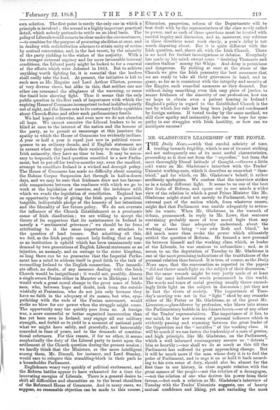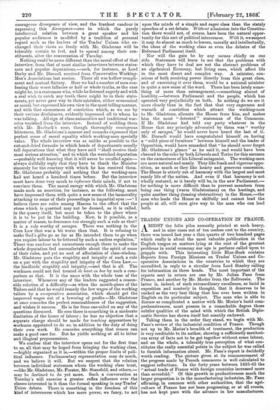MR. GLADSTONE'S LEADERSHIP OF THE PEOPLE.
THE Daily News,—with that careful sobriety of tone, tending towards frigidity, which is one of its most striking and not unfrequently one of its most useful characteristics, proceeding as it does not from the " superfine," but from the most thoroughly liberal latitude of thought,—throws a little cold water on Mr. Gladstone's interview with the Trades' Unionist working-men, which it describes as somewhat " thea- trical," and for which, on Mr. Gladstone's behalf, it rather needlessly apologizes. We confess that the interview strikes us in a totally different light. It seems to us one of the best first fruits of Reform, and opens out to our minds a wider view of the relation in which a great Prime Minister like Mr. Gladstone might stand not merely to Parliament., but to any external part of the nation which, from whatever causes, might find that Parliament was unable adequately to articu- late its wants. When Mr. Gladstone, in the warmth of debate, pronounced, in reply to Mr. Lowe, that sentence containing probably more of true moral logic than any of us at the time adequately understood, about the working classes being " our own flesh and blood," he did much more than evoke the power which ultimately settled the question of Reform. He formed a new personal' tie between himself and the working class, which, as leader of the Liberals, he was anxious to enfranchise ; and, as it seems to us, the deputation of Tuesday to Mr. Gladstone is one of the most promising indications of the fruitfulness of the personal relation thus formed. It is true, of course, as the Daily News says, that the conversation as reported in the papers " did not throw much light on the subject of their discussion." But the same remark might be very justly made of at least half the most influential words pronounced in this world. The words and tones of social greeting usually throw exceed- ingly little light on the subject in discussion ; yet they are in fact the rivets of society. The importance of Tues- day's meeting was not in the " light " shed by any remarks either of Mr. Potter or Mr. Gladstone, or of the great Mr. Liecester,—glass-blower by profession, who blows into atoms the Parliamentary bubble in his leisure hours,—or of any other of the Trades' representatives. The importance of it lies, to our mind, in the new stream of personal influence which is evidently passing and repassing between the great leader of the Opposition and the " notables " of the working class. It will be much if we can fasten the leadership of a man of genius, and high principle, like Mr. Gladstone, on the Parliament, which a well informed contemporary assures us " detests " him so heartily ;—nor shall we do as much as this till the Parliament has suffered its great approaching change. But it will be much more if the man whose duty it is to feel the pulse of Parliament, and to urge it on or hold it back accord- ing to his own sense of duty, should also be, almost for the first time in our history, in close organic relation with the great masses of the people—not the relation of a demagogue, —not the relation of one who derives his power from their favour,—but such a relation as Mr. Gladstone's interview of Tuesday with the Trades' Unionists suggests, one of hearty mutual confidence and liking, yet not excluding the most expressing this divergence—one in which the purely intellectual relation between a great speaker and his popular audiences is modified by a tradition of personal regard such as the leaders of the Trades' Unions who ex- changed their views so freely with Mr. Gladstone will be tolerably certain to feel, and to spread among their con- stituents, after the conversation of Tuesday.
Nothing could be more different than the moral effect of that interview, from that of most similar interviews between states- men and popular deputations,—such, for instance, as Lord Derby and Mr. Disraeli received from Conservative Working- Men's Associations last session. There all was hollow compli- ment and mutual flattery. Here we had a number of men con- fessing their worst, fallacies or half or whole truths, as the case might be, to a statesman who, while he listened eagerly and with a real wish to catch any truth there might be in their state- ments, yet never gave way to their mistakes, either economical or moral, but expressed his own view in the most telling manner, and with that earnestness of conviction which, as we see by their various disclaimers, evidently impressed all to whom he was talking. All sign of class-animosities and traditional war- cries vanished from the interview. Instead of scolding them with Mr. Roebuck's sour, though thoroughly courageous bitterness, Mr. Gladstone's manner and remarks expressed that perfect sense of moral equality which working-men specially value. The whole interview was as unlike as possible to the cut-and-dried formulae in which heads of departments usually tell deputations that what they have said " shall receive their most serious attention," and to which the wretched deputation —probably well knowing that it will never be recalled again— always dutifully reply that they have to thank the Minister sincerely for the courtesy with which he has received them. Mr. Gladstone probably said nothing that the working-men had not heard a hundred times before. Bat the interview must have done very much to influence their minds, if not to convince them. The moral energy with which Mr. Gladstone made such an assertion, for instance, as the following, must have impressed them with quite a new sense of the immorality attaching to some of their proceedings in impartial eyes :—" I believe there are rules among Masons to the effect that the stone which is quarried may not be dressed, as it is called, in the quarry itself, but must be taken to the place where it is to be put in the building. Now, is it possible, as a matter of reason, to denounce too strongly such a rule as that? It is a rule worthy of savages. There was nothing in the Corn Law that was a bit worse than that. It is refusing to make God's gifts go as far as He intended them to go when you require labour to be fettered by such a useless regulation." There was candour and earnestness enough there to make the whole deputation feel uncomfortable about the spirit of some of their rules, and yet no sort of affectation of class-wisdom. Mr. Gladstone puts the stupidity and iniquity of such a rule on a par with the stupidity and iniquity of the Corn Law,— the landlords' stupidity and iniquity,—and that is all. The workmen could not feel treated de haut en bas by such a com- parison as that. It is the same with the whole tone of the interview. Whenever any of the leaders suggested a reason- able solution of a difficulty—as when the month-piece of the Tailors said that he would remedy the low wages of the working tailors by a co-operative association, which should get the improved wages out of a lowering of profits—Mr. Gladstone at once concedes the perfect reasonableness of the suggestion, and wishes it success. He is far from one-sided on any of the questions discussed. He sees there is something in a moderate limitation of the hours of labour ; he has no objection that a separate charge should be made for teaching apprentices by workmen appointed to do so, in addition to the duty of doing their own work. He concedes everything that reason can make a good case for. But he yields nothing at all to bitter and illogical prepossessions. We confess that the interview opens out for the first time to us, all that may be hoped from bringing the working class, —highly organized as it is,—within the proper limits of poli- tical influence. Parliamentary representation may do much, and we believe it will. But we suspect that the relation between individual statesmen whom the working class trust, —like Mr. Gladstone, Mr. Forster, Mr. Stansfeld, and others,— may be destined to do yet more. Such a conversation as Tuesday's will exercise a greater reflex influence over the classes interested in it than the formal speaking in any Trades' Union debate. There is something in the freedom of this kind of intercourse which has more power, we fancy, to act courageous divergence of view, and the frankest candour in i upon the minds of a simple and eager class than the stately speeches of a set debate. Without admission into the Constitu- tion there would not, of course, have been the natural oppor- tunity for this sort of political intercourse. With it, we suspect it may do almost as much to leaven, morally and intellectually, the ideas of the working class as even the debates of the Reformed Parliament itself.
Nor will the gain be by any means chiefly on one side. Statesmen will learn to see that the problems with which they have to deal are not the abstract problems of an algebraical Economy, but living ones, which affect life in the most direct and complex way. A minister, con- scious of both receiving power directly from this great class, and of exercising it over them, would be a national minister in quite a new sense of the word. There has been lately some- thing of more than estrangement,—something almost of hostility,—between Parliament and the people, which has operated very prejudicially on both. In nothing do we see it more clearly than in the fact that that very eagerness and warmth of conviction which attract the working-men to Mr. Gladstone, alienate the House from him, and makes him the most " detested " statesman of the Commons. If Mr. Gladstone had told any party whatever in the House that any principle advocated by them was " worthy only of savages," he would never have heard the last of it. Mr. Disraeli would have congratulated himself on having a " solid piece of furniture " between himself and the leader of Opposition, would have remarked that "he should never forget Mr. Gladstone's glance " as he said it, and would have been cheered to the echo by both Liberals and Tories for this sarcasm on the earnestness of his Liberal antagonist. The working-men are more natural and manly. They like frank and vigorous oppo- sition, as much as they like hearty and generous concession. The House is utterly out of harmony with the largest and most manly life of the nation. And even if that harmony is not wholly restored, as it barely will be, in the new Parliament,— for nothing is more difficult than to prevent members from being one thing (warm Gladstonians) on the hustings, and quite another thing (teasing obstructives) in the House,—the man who leads the House so skilfully and cannot lead the people at all, will soon give way to the man who can lead both.



































 Previous page
Previous page